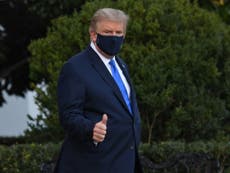Here’s what awaits the US economy amid uncertainty around Trump’s health
Despite the ongoing confusion, things may be going better than expected, writes Hamish McRae


We can have no idea how the Donald Trump saga will end. So what you do when you don’t know something is to focus on what you do know. Set aside politics and look at economics, because we actually know quite a lot about the US economy as it recovers from Covid-19. Here are four positive features and one negative one – four weddings and a funeral, if you like – and some thoughts about what it means for us on this side of the Atlantic.
First, we know that Federal Reserve policy will not be changed by the election. It will remain very loose. At the Fed’s meeting last month, it confirmed that interest rates would remain near zero for several years. Its chair, Jerome Powell, said that “rates will remain highly accommodative until the economy is far along in this recovery”.
He described that guidance as “powerful”, and when the Fed chair says something is powerful, you’d better believe it. The world will be flooded with dollars. In a long-term view, this carries obvious dangers. People may over-borrow; inflation will probably return. Short-term, however, this is positive.
Second, fiscal policy will remain loose too. The numbers for the budget deficit are so massive that they become almost meaningless – the deficit was more than $3 trillion for the first 11 months of the current fiscal year. But from a macro-economic point of view, all we need to know is that policy will be loose whoever is in the White House next year. Were Joe Biden to be president, taxes on the rich would probably rise somewhat, but overall spending would probably rise a bit too. The fiscal dial will not shift much, particularly since all presidents have to get their plans through Congress. The rest of the world can be assured that US fiscal policy will keep pushing the economy forward – another positive.
Third, US hi-tech companies will continue to be the big winners from the crisis. We all rely much more on Amazon, Apple, Google, Microsoft, Facebook, etc, than we did a year ago. The world economy has seen five years of structural change in five months. This has happened irrespective of American politics, and is a powerful demonstration that the importance of the US goes far beyond whoever happens to be president at any one time.
This leads to a fourth positive feature: through technology, the world economy will become more efficient, and that will help secure the recovery and drive up living standards through the next cycle. We have all been forced to change our behaviour. Not all of those changes have been wonderful by any means, and many people have been badly hit at every level. We should never forget that. But we have learnt how to use technology better. We waste less time in meetings and telecommunicate more. We spend less time commuting and shopping. Some of these changes will stick, helping the US in the first instance but helping the rest of us as well.
And the negative feature? I am desperately worried about the unfairness of it all. Huge swathes of Americans have had their life chances damaged by Covid-19. Many have died before their time, as has happened everywhere, but the damage goes far beyond that. Young people leaving school or university may be at a disadvantage for life. People who lose their jobs in mid-career may find it impossible to recover.
All countries have had winners and losers from the pandemic, though, of course, there have been more losers than winners. However, while all developed countries have safety nets and all safety nets have holes in them, the US welfare system is quite fragmented. When you get an economic blow on this scale, it is impossible to protect everyone, but I fear the blow is hitting some US families harder than people in a similar position elsewhere.
And the implication for those of us in Britain and Europe? Simply this: if the US economy does stage a decent and sustained recovery, as I think it will, that will feed through to the rest of the developed world and beyond to the emerging world. Not enough has been heard about the damage to emerging nations and I hope that will get more attention now.
What is worth remembering, however, is that after the financial crisis and subsequent recession of 2008-9 the world had one of the longest – in some cases, the longest – periods of uninterrupted growth we have ever seen. That growth phase was led by the American economy. Whatever happens in US politics in the coming days, we should hope for a similar economic recovery.




Join our commenting forum
Join thought-provoking conversations, follow other Independent readers and see their replies
Comments